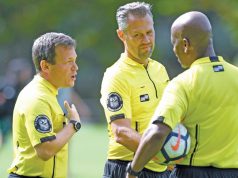Carl, I think I’m becoming a softy at assessments.”
Matt Slovacek is a referee and assessor from Michigan.
That was the way the email started. He was writing to let me know about some assessment feedback he had given. We are both “hard” assessors. Both of us have double-digit percentage “did not meet criteria” numbers. The good news — if either Matt or I give you a passing grade, assigners will move you up a level in tougher grades.
Here is his redacted report: “I wanted to send you this email to let you know my observations in a U-19B game in <city> on the 20th. The referee going for upgrade was <referee’s name>.
“The first half of the game was quite uneventful. The second half was quite the contrary … with a few situations to handle, four cautions and one send-off.
“While <referee’s name> has what I consider to be the beginning skill-set of a grade 7, he has a long way to go to get these engrained into solid habits.
“He seemed to have created a number of difficulties for himself on the field; and at the same time did not exhibit any preventive actions. He was very reactive in his officiating style. However, I did see a person committed to improvement.
“It was based upon those things collectively that I decided to pass him — albeit with a low score. I’m positive that if he were to get the coaching he needs, he would (eventually) become a very solid referee.”
In the past.
My reply to Matt reaffirmed his words and actions.
“That compassion may serve you well — in rare cases. One referee came to <another state> for a <lower-level professional league> game years ago. Toward the end of the game, I’m looking at potential scores for him — three different ways to assign points. I can’t get above 69 any of the three ways (70 was the score needed for a passing assessment).
“Game ended and many players from both teams went out of their way to shake his hand. If the players were appreciative of his decisions, that was the 70th point!”
Why?
Why did I make the decision to be a “hard” assessor? I was one of a dozen or more assessors at a youth regional competition. I watched a veteran English referee (recently moved to U.S. and wearing a grade 8 badge) work the game, probably a U-15. He ran well, made sound decisions, interacted well with players and coaches. His downfall — signals.
As expected by anyone from outside the U.S., he did not use USSF signals to indicate restarts, misconduct, etc. So, in the feedback session, I gave him some positive reinforcement and mentioned his signals needed improvement to progress here. Feeling good about my decisions and comments, I wrote up a passing assessment.
Once while at a youth regional tournament, I provided a National Assessor with 45 seconds of feedback. He then provided me with five words of advice that changed my entire assessing career: “Will he change his behavior?” As an assessor, I have worked hard to follow that specific guideline by making sure my postgame verbal and written comments make it possible for the referee to alter or improve his officiating skills for his next set of games. “Tough” love from an assessor is not a bad thing.
What's Your Call? Leave a Comment:
Note: This article is archival in nature. Rules, interpretations, mechanics, philosophies and other information may or may not be correct for the current year.
This article is the copyright of ©Referee Enterprises, Inc., and may not be republished in whole or in part online, in print or in any capacity without expressed written permission from Referee. The article is made available for educational use by individuals.


















